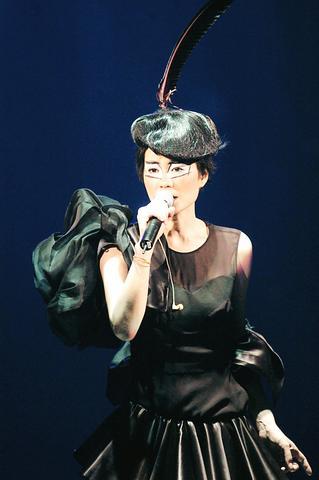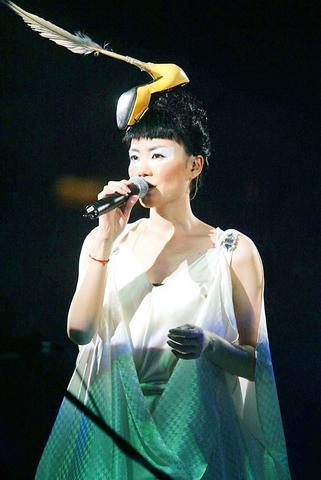Among the female Mando-pop stars, there's a fairly clear division between the girls and the women, and it's not simply an issue of age.
In the girl camp, Jolin Tsai (蔡依林) epitomizes the lasting appeal of the girl next door, with the barely concealed, budding sexuality that she flaunted at a concert last weekend in Taipei.

PHOTO COURTESY OF SILVER FISH
Meanwhile, on the women's side, Faye Wong (王菲) reigns supreme for her grace and captivating unattainability, a type of regal aloofness nurtured over 15 years as a vaguely mysterious superstar whose audiences with the public are carefully staggered and always preceded by much fanfare and excitement. Her concert tomorrow at Taipei's Municipal Stadium is no exception.

PHOTO COURTESY OF SILVER FISH
As of press time, the only tickets remaining are for the "rock and roll" section of the stadium, which is the standing area on the field starting from about 50m from the stage. These are going for NT$1,500 a piece, but before anyone chokes on their tea, those are the medium-priced tickets. All the prime tickets in the NT$3,000 to NT$2,500 range were sold out weeks ago, along with the NT$800 and NT$1,000 tickets. The sales so far ensure a crowd of about 40,000.
Wong generates such massive following by being, first and foremost, one of the most gifted singers in Mando-pop, a talent handed down, she says, by her mother who was a revolutionary opera singer in China. It no doubt also helped that she inherited a 175cm frame and a model's good looks.
Her first album was her self-titled debut when she performed under the name Shirley Wong, released in 1989, less than two years after migrating from her native Beijing to Hong Kong's greener pastures. Since then, she's transformed herself multiple times, first ditching her original stage name in favor of her current one after taking a break in the US between 1991 and 1992, and later taking the path of most Hong Kong pop stars to experiment with movie roles, notably in Wang Kar Wai's (王家衛) Chunking Express (重慶森林) and most recently 2046.
Wong also had a brief fascination for the ethereal music of the Cocteau Twins in the mid-1990s, which manifested itself in three covers of the Scottish band's songs on Wondering Music (胡思亂想, 1994) and collaborations with the band on Impatience (浮躁, 1996), and Faye Wong (快樂不快樂, 1997). The collaborations seemed tailor-made, as Wong shares the same distant-sounding, high-pitched siren voice of the Cocteau Twins' Elizabeth Fraser, and the gauzy aesthetic of the Twins' album covers even made its way onto Wong's album cover art.
The overwhelming Cocteau Twins influence began to wane, though, with the release of Sing and Play (唱游, 1998) and Only Love Strangers (只愛陌生人, 1999), when Wong set off in a more blatantly pop direction. She still retained some of the edge that continued her flirtation with anti-pop status, but the sound became more accessible, and, dare one say it, KTV-friendly. Her most recent album, To Love (將愛, 2003), is a mosh of her two recent artistic tendencies: saccharine pop and daring avant-garde.
By juggling these two styles, Wong's status has only risen over the years. So much so that, even without releasing any new material, she can drop into town and pack a stadium, as she's sure to do tomorrow.
Performance notes:
What: No Faye, No Live
When: Tomorrow, 7pm
Where: Taipei Municipal Stadium, 46 Bade Rd, Sec 1, Taipei (
Tickets: Available at door or through Era ticketing at www.ticket.com.tw. Only tickets for NT$1,500 remain.

Towering high above Taiwan’s capital city at 508 meters, Taipei 101 dominates the skyline. The earthquake-proof skyscraper of steel and glass has captured the imagination of professional rock climber Alex Honnold for more than a decade. Tomorrow morning, he will climb it in his signature free solo style — without ropes or protective equipment. And Netflix will broadcast it — live. The event’s announcement has drawn both excitement and trepidation, as well as some concerns over the ethical implications of attempting such a high-risk endeavor on live broadcast. Many have questioned Honnold’s desire to continues his free-solo climbs now that he’s a

As Taiwan’s second most populous city, Taichung looms large in the electoral map. Taiwanese political commentators describe it — along with neighboring Changhua County — as Taiwan’s “swing states” (搖擺州), which is a curious direct borrowing from American election terminology. In the early post-Martial Law era, Taichung was referred to as a “desert of democracy” because while the Democratic Progressive Party (DPP) was winning elections in the north and south, Taichung remained staunchly loyal to the Chinese Nationalist Party (KMT). That changed over time, but in both Changhua and Taichung, the DPP still suffers from a “one-term curse,” with the

Jan. 26 to Feb. 1 Nearly 90 years after it was last recorded, the Basay language was taught in a classroom for the first time in September last year. Over the following three months, students learned its sounds along with the customs and folktales of the Ketagalan people, who once spoke it across northern Taiwan. Although each Ketagalan settlement had its own language, Basay functioned as a common trade language. By the late 19th century, it had largely fallen out of daily use as speakers shifted to Hoklo (commonly known as Taiwanese), surviving only in fragments remembered by the elderly. In

Lines between cop and criminal get murky in Joe Carnahan’s The Rip, a crime thriller set across one foggy Miami night, starring Matt Damon and Ben Affleck. Damon and Affleck, of course, are so closely associated with Boston — most recently they produced the 2024 heist movie The Instigators there — that a detour to South Florida puts them, a little awkwardly, in an entirely different movie landscape. This is Miami Vice territory or Elmore Leonard Land, not Southie or The Town. In The Rip, they play Miami narcotics officers who come upon a cartel stash house that Lt. Dane Dumars (Damon)